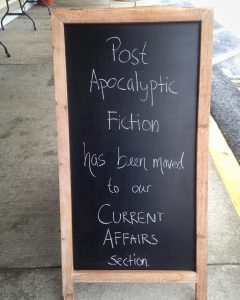 In the Bulletin of the Atomic Scientists (9 December 2016), Seth Baum, executive director of the Global Catastrophic Risk Institute offers an discomforting, though measured, account of "What Trump means for global catastrophic risk."
In the Bulletin of the Atomic Scientists (9 December 2016), Seth Baum, executive director of the Global Catastrophic Risk Institute offers an discomforting, though measured, account of "What Trump means for global catastrophic risk."
"Global catastrophic risks are those that threaten the survival of human civilization. Of all the implications a Trump presidency has for global catastrophic risk—and there are many—the prospect of him ordering the launch of the massive US nuclear arsenal is by far the most worrisome. In the United States, the president has sole authority to launch atomic weapons."
If Trump were to order an unwarranted launch, it could be stopped only by disobedience of military personnel, whom he could then replace.
Aside from planning to either persuade or disobey the president, the only way to avoid nuclear war is to try to avoid the sorts of crises that can prompt nuclear launch. "The United States has long been too dismissive of Moscow’s very legitimate security concerns regarding NATO expansion, missile defense, and other encroachments. … Trump’s unconventional friendliness nonetheless offers a valuable opportunity to rethink US-Russia relations for the better. On the other hand, conciliatory overtures toward Russia could backfire. … Russia could become aggressive."
There is a risk that Trump’s defiance of democratic norms and institutions may make the US government itself becomes authoritarian—and many of hius supporters seem to favour that. "Already, government officials are discussing how best to resist illegal and unethical moves from the inside, and citizens are circulating expert advice on how to thwart creeping authoritarianism."
An authoritarian US government would be a devastating force," Baum says, weilding "overwhelming military and intelligence capabilities to even more disastrous effect."
Trump tends towards an isolationist mercantilism that would have the United States look out for its unenlightened self-interest and nothing more. This would have "important implications for catastrophic risk," that would risk, "putting the world on course for another major war, this time with deadlier weapons." On the other hand, globalization has its own risks of rapid economic destabilisation.
"Climate change will not wipe out human populations as quickly as a nuclear bomb would, but it is wreaking slow-motion havoc  that could ultimately be just as devastating. Trump has been all over the map on the subject, variously supporting action to reduce emissions and calling global warming a hoax."
that could ultimately be just as devastating. Trump has been all over the map on the subject, variously supporting action to reduce emissions and calling global warming a hoax."
"Just because election-winning politicians have been of a particular mold in the past, doesn’t mean the same kind of leaders will continue to win. Likewise, just because we have avoided global catastrophe so far doesn’t mean we will continue to do so."
Meanwhile The Bookloft‘s photo offers some light relief.




